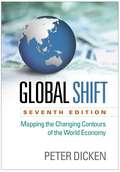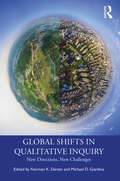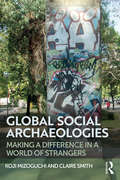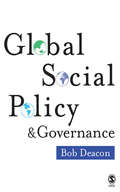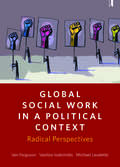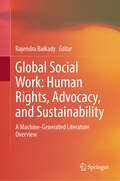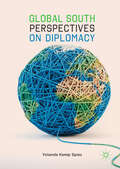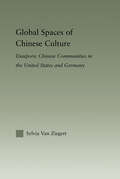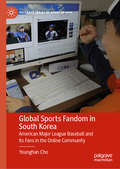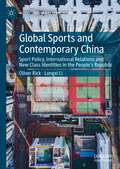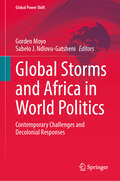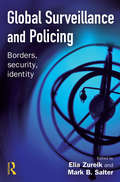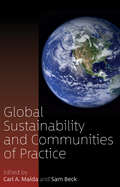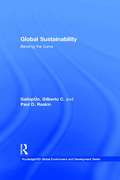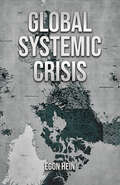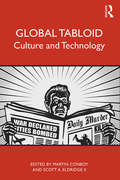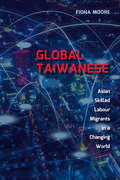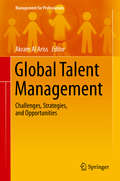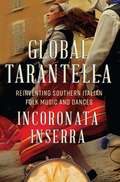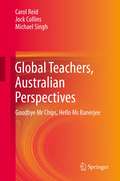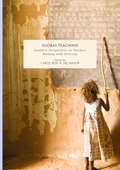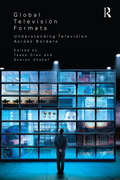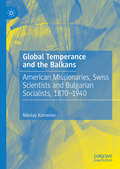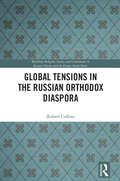- Table View
- List View
Global Shift
by Peter Dicken"A magnificent achievement. Since the publication of the first edition in 1986, Peter Dicken has constructed in successive editions a phenomenal record of the changing geography of capital accumulation on a world scale... An essential companion for anyone concerned to understand the rapid geographical shifts occurring in the world's economic power relations in these stressful and troubled times." - David Harvey, Distinguished Professor, CUNY Graduate Center, New York "A masterful new edition of a masterful text. Once again, Peter Dicken is at the cutting edge of the analysis of economic globalization and global trends. Global Shift is the authoritative text on these issues." - David Held, Co-Director, Centre for the Study of Global Governance, LSE "Covers a vast empirical range but is always closely attentive to the underlying processes, impacts, and meanings of globalization. Dicken's approach beautifully integrates the economic and the political with problems of equity and ethics - a rare accomplishment. Ideal for undergraduate classes across the social sciences." - Erica Schoenberger, Department of Geography, Johns Hopkins University This sixth edition of Global Shift has been completely revised and updated using the latest available sources. Each chapter has been extensively rewritten and new chapters introduced to take account of recent empirical developments, new ideas on production, distribution, and consumption in the global economy and the implications of the global financial crisis. This now standard work on economic globalization provides: The most comprehensive and up-to-date explanation of economic globalization available, examining the role of transnational corporations, states, labour, consumers, and organizations in civil society and the power relations between them A clear guide to how the global economy is being transformed through the operation of global production networks involving transnational corporations, states and interest groups and technology Detailed discussion of different theories of economic globalization A new chapter on the environmental impacts of globalizing processes Extended discussion of problems and institutions of global governance in the context of the global economic crisis and of the role of corporate social responsibility Boadened sectoral case studies including a new case study on resource-extractive industries, and an extended chapter on financial and advanced business services. The extensive use of graphics, lack of jargon and clear definition of terms, makes Global Shift the key resource on economic globalization in the social science literature.
Global Shift, Seventh Edition
by Peter DickenThe definitive text on globalization, this book provides an accessible, jargon-free analysis of how the world economy works and its effects on people and places. Peter Dicken synthesizes the latest ideas and empirical data to blaze a clear path through the thicket of globalization processes and debates. The book highlights the dynamic interactions among transnational corporations, nations, and other key players, and their role in shaping the uneven contours of development. Mapping the changing centers of gravity of the global economy, Dicken presents in-depth case studies of six major industries. Now in full color throughout, the text features 228 figures. Companion websites for students and instructors offer extensive supplemental resources, including author videos, applied case studies with questions, lecture notes with PowerPoint slides, discipline-specific suggested further reading for each chapter, and interactive flashcards. New to This Edition: *Every chapter thoroughly revised and updated. *All 228 figures (now in color) are new or redesigned. *Addresses the ongoing fallout from the recent global financial crisis. *Discussions of timely topics: tax avoidance and corporate social responsibility; global problems of unemployment, poverty, and inequality; environmental degradation; the Eurozone crisis; and more. *Enhanced online resources for instructors and students.
Global Shifts in Qualitative Inquiry: New Directions, New Challenges (International Congress of Qualitative Inquiry Series)
by Norman K. Denzin Michael D. GiardinaPositioned within and against our changing pandemic conditions, Global Shifts in Qualitative Inquiry highlights multidirectional pathways between and across moments, formations, and interpretive communities within qualitative research. Contributors focus on a range of prevailing and emerging approaches that are held together by a commitment to a critical, performative, social justice inquiry—to method as praxis, method as a tool for social change, method to effect change in the world by creating texts that move persons to action, that move from personal troubles to public institutions. These include art as research, story as research, collage as method, performance, posthumanism, Indigenous methods, and the use of absurdity to counter oppression. Global Shifts in Qualitative Inquiry will resonate with faculty and students alike who are interested in forging new directions for qualitative inquiry in our ever-evolving pandemic times.
Global Social Archaeologies: Making a Difference in a World of Strangers
by Koji Mizoguchi Claire E SmithGlobal Social Archaeologies contributes to the active engagement of contemporary social archaeology through addressing issues such as postcolonialism, community heritage, and Indigenous rights. It addresses the major challenge of breaking down global divides, especially in relation to fundamental human rights, inequality, and inequities of wealth, power, and access to knowledge. This authoritative volume, authored by the current and past presidents of the World Archaeological Congress, introduces readers to the various theoretical and methodological tools available for the investigation of the past. Taking into account the implications for contemporary societies, it offers a new framework for social archaeologies in a globalised world. By combining new data from their research with an innovative synthesis and analysis of leading research by others, the authors have developed fresh conceptualisations and understandings of archaeology as a social practice, and of the ways in which it simultaneously straddles the past, present, and future. Exploring a range of case studies and enhanced by a wealth of illustrations, Global Social Archaeologies highlights a new approach to archaeology, one that places human rights at the core of archaeological theory and practice.
Global Social Policy and Governance: New Research And Policy Agendas In Africa, Asia, Europe And Latin America (Routledge Advances In International Relations And Global Politics Ser.)
by Bob Deacon`This primer on the global politics of social policy … is essential reading for students as well as others seriously interested in improving the human condition. Nuanced and critical, Deacon′s book offers a much needed and constructive guide to the complex supra-national debates over rights, regulation and redistribution impinging on social welfare all over the world′ - Jomo K.S., United Nations Assistant, Secretary-General for Economic Development `This book is very timely and addresses many issues that are en vogue at the moment. It relates social policy studies to other fields such as global governance and development studies and thus opens up new discussions in the subject area′ - Dr Antje Vetterlein, University of Oxford Global Social Policy and Governance offers an authoritative understanding of the way social policies at national and supra-national level are shaped in the context of globalisation. The book: " evaluates national social policies advanced by international organisations. " examines policies addressing global social redistribution, regulation and rights. " highlights the roles of global actors, including INGOs, consultants, think tanks, task forces and global policy advocacy coalitions. " explores the political obstacles to reforms in global social governance, " outlines the growing importance of global social movements. " presents arguments for more effective global and regional social policies. " is illustrated by case studies, further reading sections and a glossary. Global Social Policy and Governance will be an essential text for students of social policy, development studies and international relations. It will also be invaluable reading for those shaping social policies in international organisations and those in social movements seeking to influence them. Bob Deacon is Professor of International Social Policy at the University of Sheffield.
Global Social Work in a Political Context: Radical Perspectives
by Iain Ferguson Vasilios IoakimidisHow is social work shaped by global issues and international problems and how should it address them? This book employs a radical perspective to examine international social work. Globalisation had opened up many issues for social work, including how to address global inequalities, the impact of global economic problems and trends towards neoliberalism. By examining the origins of modern social work, problematising its definition and addressing the care/control dichotomy the book reveals what we can learn from different approaches and projects across the globe. Case studies from the UK, the US, Canada, Spain, Latin America, Australia, Hungary and Greece bring the text to life and allow both students and practitioners to apply theory to practice.
Global Social Work: A Machine-Generated Literature Overview
by Rajendra BaikadyThis book is a product of human-machine collaboration in social work and is a premier in global social work education and practice. Each chapter is organized by the book editor with a human-written introduction. Chapters focus on contemporary issues, providing an updated, comprehensive and in-depth understanding of the latest developments in the field of social work, including social work with marginalized communities, social work and social policy, social work and human rights, social work advocacy, social activism, social work and sustainability. It offers comprehensive literature on global social work, its challenges and future directions. Chapters in this book help readers understanding contemporary debates, discussions and insights on global social work and its growth and development. The book is immensely useful for scholars studying social work, policy, welfare, exclusion and inclusion, sociology and other social science discipline. It is equally valuable to undergraduate and postgraduate social work students across all educational institutions without boundaries. The auto-summaries have been generated by a recursive clustering algorithm via the Dimensions Auto-summarizer by Digital Science. The editor of this book selected which Springer Nature content should be auto-summarized and decided its order of appearance. Please be aware that these are extractive auto-summaries, which consist of original sentences, but are not representative of its original paper, since we do not show the full length of the publication. Please note that only published SN content is represented here, and that machine-generated books are still at an experimental stage.
Global South Perspectives on Diplomacy
by Yolanda Kemp SpiesThis volume is a comprehensive overview of the various methods used in contemporary diplomatic practice. It incorporates the traditional modes of diplomacy and explains how these modes have evolved to deal with a burgeoning international community of state and non-state actors, the information and communications revolution and the changing profile of global conflict. The pursuit of “development diplomacy” is an integral part of the project, with due attention to the fault-lines, microcosms of power-politics and rapid evolution within the society of states that make up the Global South. All chapters are extensively illustrated with recent case examples from across the world.
Global Spaces of Chinese Culture: Diasporic Chinese Communities in the United States and Germany (Studies in Asian Americans)
by Sylvia Van ZiegertThis book is an exploration of how Chinese communites in the United States and Germany create and disseminate a sense of diasporic Chinese identity. It not only compares the local conditions of the Chinese communities in the two locations, but also moves to a global dimension to track the Chinese transnational imaginary. Van Ziegert analyzes three strategies that overseas Chinese use to articulate their identities as diasporic subjects: being more American/German being more Chinese hybridizing and commodifying Chinese culture through trans-cultural performances. These three strategies are not mutually exclusive and they often intersect and supplement each other in unexpected ways. The author also analyzes how the everyday lives of overseas Chinese connect with global and local factors, and how these experiences contribute to the formation of a global Chinese identity.
Global Sports Fandom in South Korea: American Major League Baseball and Its Fans in the Online Community (Palgrave Series of Sport in Asia)
by Younghan ChoThis book explores the transformation of cultural and national identity of global sports fans in South Korea, which has undergone extensive cultural and economic globalization since the 1990s. Through ethnographic research of Korean Major League Baseball fans and their online community, this book demonstrates how a postcolonial nation and its people are developing long-distance affiliation with American sports accompanied by nationalist sentiments and regional rivalry. Becoming an MLB fan in South Korea does not simply lead one to nurturing a cosmopolitan identity, but to reconstituting one’s national imaginations. Younghan Cho suggests individuated nationalism as the changing nature of the national among the Korean MLB fandom in which the national is articulated by personal choices, consumer rights and free market principles. The analysis of the Korean MLB fandom illuminates the complicated and even contradictory procedures of decentering and fragmenting nationalism in South Korea, which have been balanced by recalling nationalism in combination with neoliberal governmentality.
Global Sports and Contemporary China: Sport Policy, International Relations and New Class Identities in the People’s Republic (Global Culture and Sport Series)
by Oliver Rick Longxi LiThis book examines the formation of a globally oriented sports system in China, from the beginning of the reform process in 1978 to the present, focusing on the period after the Beijing 2008 Olympic Games. It analyses how this system has shaped domestic social class identities and its role in international Chinese state politics. Despite advances in the marketization of the sports industry through previous eras, the Chinese state expanded investment in a set of global sports following the heavily government-directed drive towards national success at the 2008 Beijing Summer Olympic Games. This would be a time when the government focused on policies set to service a growing domestic middle-class and an increasingly wide-ranging set of international interests, with sporting investments being at the heart of their strategic plan. However, reform has proven difficult. The book presents a well-rounded account of this effort with tennis and soccer providing important case studies of the internal and external dynamics of this time. As such, the book will be of interest to researchers and students of globalization of sport, those studying East Asian sports development, and those who are interested in understanding China more broadly.
Global Storms and Africa in World Politics: Contemporary Challenges and Decolonial Responses (Global Power Shift)
by Sabelo J. Ndlovu-Gatsheni Gorden MoyoAfrica provides a unique perspective to understand today's global crises. This book explores how Africa, positioned historically in a subaltern role due to colonialism, offers a critical lens on the shifting dynamics of the modern world system. The book presents how Africa's continued struggles against racism, colonialism, and economic exploitation make it a powerful site for rethinking the global order. Addressing ecological, ideological, financial, health, and systemic crises, the book demonstrates how problems in Africa are intrinsically linked to global issues. It argues that the so-called decolonization after 1945 was superficial, maintaining global hierarchies that marginalize Africa. With insights from thinkers like Nkrumah and Rodney, it challenges the entrenched structures of racial capitalism and offers new pathways for genuine global equity and justice. This book will appeal to students, scholars, and researchers of international relations, economics, political science, and related disciplines, as well as policy-makers interested in a better understanding of the ongoing global power shift and Africa's challenges and position within the modern world system.
Global Surveillance and Policing
by Mark Salter Elia ZureikSince the 9.11 attacks in North America and the accession of the Schengen Accord in Europe there has been widespread concern with international borders, the passage of people and the flow of information across borders. States have fundamentally changed the ways in which they police and monitor this mobile population and its personal data. This book brings together leading authorities in the field who have been working on the common problem of policing and surveillance at physical and virtual borders at a time of increased perceived threat. It is concerned with both theoretical and empirical aspects of the ways in which the modern state attempts to control its borders and mobile population. It will be essential reading for students, practitioners, policy makers.
Global Sustainability and Communities of Practice
by Carl A. Maida Sam BeckCollaboration between experts and the public is vital for effective community engagement aimed at improving the lives of the most vulnerable in society, whether at the local or global level. Using case-based and theoretical chapters that examine rural and urban communities of practice, this volume illustrates how participatory researchers and students, as well as policy and community leaders, find ways to engage with the broader public when it comes to global sustainability research and practice.
Global Sustainability: Bending the Curve (Routledge/SEI Global Environment and Development Series #Vol. 3)
by Gilberto C. Gallopín Paul D. RaskinUnprecedented levels of wealth, technology and institutional capacity can forge a just, peaceful and ecologically resilient future. However, the authors argue, social polarization, geo-political conflict and environmental degradation are threatening the long-term well-being of humanity and the planet. Global Sustainability explores the alternative futures that could emerge from the resolution of these antagonisms. Based on extensive international and interdisciplinary research, the book identifies the perils of market-driven scenarios and considers the possibility of the failure of conventional approaches. It also, however, presents a vision of the possibility of a 'Great Transition' in which revised human values and development goals bring a new stage of civilization. It will be essential reading for all scholars and professionals interested in the future of the environment, international affairs, and sustainable development.
Global Systemic Crisis
by Egon HeinOur world has transformed over recent decades with concerning trends that threaten to destabilize nation states, abolish society and culture, establish digital control over individuals, erase identity, and diminish what makes us human. While the economic crisis garners attention, today’s crisis encompasses much more – politics, civil society, science, philosophy, education, art, religion, traditional values, and other facets of life. This signals a systemic crisis of modern global capitalism. This book surveys today’s pivotal trends, contrasting the dying old world with the emerging new one including their social systems, social sciences, and conceptions of humanity. Drawing on extensive research, it features interviews and lectures by prominent yet little-known thinkers, especially for English readers. Of particular value, the work synthesizes insights from diverse domains – news, scientific and monographic articles, video lectures, films, and manga. The copious footnotes and bibliography constitute a significant portion of the text, providing sources for further investigation. Overall, this book aims to furnish keys to analysing today’s interwoven crises, serving as a guidebook for comprehending the contemporary age holistically. It empowers readers to conduct their own inquiries into this crucial juncture that will shape the future. Sure to intrigue even those less versed in the subject matter.
Global Tabloid: Culture and Technology
by Martin ConboyThis edited collection brings together a range of contemporary expertise to discuss the development and impact of tabloid news around the world. In thirteen chapters, Global Tabloid covers tabloid developments in Asia, Africa, the Americas, Australia, and both Eastern and Western Europe. It presents innovative research from eighteen expert contributors and editors who explore tabloidization as a phenomenon, and tabloids as a news form. With an awareness of historical dynamics where tabloids played a role in national news media systems, it brings the debates around tabloids as a cultural force up to date. The book addresses important questions about the contemporary nature of popular culture, the challenges it faces in the digital era, and its impact on a political world dominated by tabloid values. Going beyond national borders to consider global developments, the editors and contributors explore how the tabloids have permeated media culture more generally and how they are adapting to an increasingly digitalized media sphere. This internationally focused critical study is a valuable resource for students and researchers in journalism, media, and cultural studies.
Global Taiwanese: Asian Skilled Labour Migrants in a Changing World
by Fiona MooreIn Global Taiwanese, Fiona Moore explores the different ways in which Taiwanese expatriates living in London and Toronto, along with globally networked professionals living in Taipei, use their shared Taiwanese identities to construct and maintain global and local networks. Based on a three-year-long ethnographic study that incorporates interviews with people from diverse backgrounds, generations, and histories, Global Taiwanesethis book explores what their different experiences tell us about migration in "tolerant" and "hostile" regimes. Global Taiwanese considers the implications in leveraging their of the Taiwanese case for understanding the processes by which transnational professionals more generally use Taiwanese ethnic identity for both business and personal purposes. in their business and personal lives. As people become increasingly mobile, ethnic identity becomes more important as a means of negotiating transnational encounters; however, at the same time, the opportunities it offers are rooted in local cultural practices, requiring professionals and other migrants to develop complex social strategies that link and cross the global and local levels. With rich ethnographic detail, this book contributes to the understanding of the migrant experience and how it varies from location to location, how migration more generally changes in response to wider socioeconomic factors, and, finally, of the specific case of Taiwan and how the distinctive nature of its diaspora emerges through wider discourses of Chineseness and pan-Asian identity.
Global Talent Management
by Akram Al ArissThis book bridges the research and practice of global talent management. It opens important theoretical and practical avenues to understand the concept internationally while focusing on developing and emerging countries. Chapters derive from various geographic regions and embrace cross-national, comparative, and interdisciplinary perspectives. An open and inclusive approach is used in assessing the challenges of global talent management, strategies to overcome these challenges, and in charting opportunities for future talent management. These three dimensions are crucial to academic researchers and business practitioners for envisioning a positive future role of talent management in businesses and societies.
Global Tarantella: Reinventing Southern Italian Folk Music and Dances
by Incoronata InserraTarantella, a genre of Southern Italian folk music and dance, is an international phenomenon--seen and heard in popular festivals, performed across the Italian diaspora, even adapted for New Age spiritual practices. The boom in popularity has diversified tarantella in practice while setting it within a host of new, unexpected contexts. Incoronata Inserra ventures into the history, global circulation, and recontextualization of this fascinating genre. Examining tarantella's changing image and role among Italians and Italian Americans, Inserra illuminates how factors like tourism, translation, and world music venues have shifted the ethics of place embedded in the tarantella cultural tradition. Once rural, religious, and rooted, tarantella now thrives in settings urban, secular, migrant, and ethnic. Inserra reveals how the genre's changing dynamics contribute to reimagining Southern Italian identity. At the same time, they translate tarantella into a different kind of performance that serves new social and cultural groups and purposes. Indeed, as Inserra shows, tarantella's global growth promotes a reassessment of gender relations in the Italian South and helps create space for Italian and Italian-American women to reclaim gendered aspects of the genre.
Global Teachers, Australian Perspectives: Goodbye Mr Chips, Hello Ms Banerjee
by Michael Singh Jock Collins Carol ReidThis is the first book on global teachers and the increasingly important phenomenon of 'brain circulation' in the global teaching profession. A teaching qualification is a passport to an international professional career: the global teacher is found in more and more classrooms around the world today. It is a two-way movement. This book looks at the growing importance of immigrant teachers in western countries today and at teachers who exit from western countries (emigrant teachers) seeking teaching experience in other countries. Drawing on the international literature in Europe, North America, Asia and elsewhere supplemented by rich insights derived from recent Australian research, the book outlines the personal, institutional and structural processes nationally and internationally underlying the increasing global circulation of teachers. It identifies the key drivers of global teacher mobility: a range of factors including family, lifestyle, classroom experience, travel, opportunities for advancement, discipline, linguistic skills, taxation rates, cultural factors and institutional frameworks and policy support. The book is the first detailed contemporary account of the experiences of Australian immigrant and emigrant teachers in the schools and communities where they teach and live. It makes an important and original theoretical and empirical contribution to the contemporary fields of sociology of education and immigration studies.
Global Teaching: Southern Perspectives on Teachers Working with Diversity (Education Dialogues with/in the Global South)
by Carol Reid and Jae MajorAt a time when social, cultural and linguistic diversity has become a characteristic of education systems around the world, this timely text considers how teacher education is responding to these developments in the context of increased mobilities within and across national boundaries. This collection draws together the work of scholars, from a range of urban, rural and national contexts from the Global South and North, who engage in dialogue about diversity and knowledge exchange. It includes perspectives from multiple contexts using a range of frameworks that cohere around attention to issues of equity and social justice, and focuses on the macro level dynamics (policy, theory, global governance) as well as meso (institutional practices) and micro dimensions (professional identities, cultural, and identity transformation). The authors explore these dynamics and dimensions through mobilities of teachers and students, cosmopolitan theory, indigenous epistemologies, language ecology, professional standards policy discourses, and critical analyses of frameworks including postcolonialism, multiculturalism and culturally responsive and relevant pedagogical approaches.
Global Television Formats: Understanding Television Across Borders
by Tasha Oren Sharon ShahafWinner of the 2013 SCMS Best Edited Collection Award For decades, television scholars have viewed global television through the lens of cultural imperialism, focusing primarily on programs produced by US and UK markets and exported to foreign markets. Global Television Formats revolutionizes television studies by de-provincializing its approach to media globalization. It re-examines dominant approaches and their legacies of global/local and center/periphery, and offers new directions for understanding television’s contemporary incarnations. The chapters in this collection take up the format phenomena from around the globe, including the Middle East, Western and Eastern Europe, South and West Africa, South and East Asia, Australia and New Zealand, North America, South America, and the Caribbean. Contributors address both little known examples and massive global hits ranging from the Idol franchise around the world, to telenovelas, dance competitions, sports programming, reality TV, quiz shows, sitcoms and more. Looking to global television formats as vital for various cultural meanings, relationships, and structures, this collection shows how formats can further our understanding of television and the culture of globalization at large.
Global Temperance and the Balkans: American Missionaries, Swiss Scientists and Bulgarian Socialists, 1870–1940
by Nikolay KamenovThis book examines the local manifestation of the global temperance movement in the Balkans. It argues that regional histories of social movements in the modern period could not be sufficiently understood in isolation. Moreover, the book argues that broad transformations of social movements – for example, the power centers associated with moral/religious temperance and the later, scientifically based anti-alcohol campaigns – are more easily identifiable through a detailed regional study. For this purpose, the book begins by sketching the historical development as well as the main historiographical themes surrounding the worldwide temperance movement. The book then zooms in on the movement in the Balkans and Bulgaria in particular. American missionaries founded the temperance movement in the closing decades of the nineteenth century. The interwar period, however, witnessed the proliferation of new, professional organizations. The book discusses the various branches as well as their international and political affiliations, showing that the anti-alcohol reform movement was one of the most important social movements in the region.
Global Tensions in the Russian Orthodox Diaspora (Routledge Religion, Society and Government in Eastern Europe and the Former Soviet States)
by Robert CollinsThis book explores the tensions which have arisen in the disapora as a result of large numbers of Russian migrants entering established overseas parishes following the collapse of the Soviet Union. These tensions, made more fervent by the increasing role of the Church as part of the expression of Russian identity, and by the Church’s entry into the global ‘culture wars’, carry with them alternative views of a range of key issues – cosmopolitanism versus reservation, liberalism versus conservatism, and ecumenism versus dogmatism. The book focuses on particular disputes, discusses the broader debates and examines the wider context of how the Russian Orthodox Church is evolving overall.

